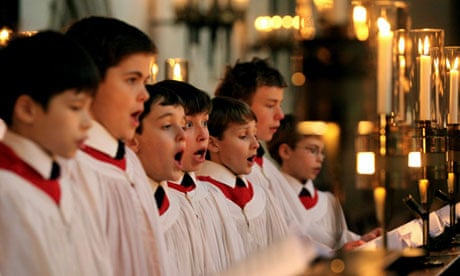As the afternoon sun beats down on the parties on Bondi Beach, Sydney, this Christmas Eve, one Australian will be thinking of the chill English winter air in Cambridge where a young choirboy will soon be stepping forward, alone, to sing the first verse of Once in Royal David's City.
The solo is the traditional opening to the annual Festival of Nine Lessons and Carols, a service that is broadcast live on Radio 4 from the chapel of King's College, Cambridge. And this year the time-honoured mix of sacred Christmas tunes, from While Shepherds Watched Their Flocks by Night to O Come All Ye Faithful, will include a new carol from Carl Vine, an Australian composer.
"I would love to be there, of course. It is a great honour," said Vine, formerly a specialist in electronic music, who was commissioned to write the piece earlier this year. His carol takes as its text a poem by Alfred, Lord Tennyson, the Victorian poet laureate. Titled Ring out, Wild Bells, it is a section of the poet's In Memoriam, and has been set to music several times before, including by George Harrison and by composer Jonathan Dove.
"I like the idea of a non-denominational poem," said Vine, 58. "It really so nicely encapsulates the broader aspects of Christmas without dealing explicitly with the nativity."
For Vine, who might be described as a semi-reformed modernist, carols are the perfect expression of what he now believes music should do: bring people together.
"It is part of the process of my musical language," he said. "I believe in melodies that you can sing and that actually quite explicitly seek community."
As a young man, Vine wrote austere, ultra-modernist work, but later underwent a conversion to a more accessible, melodic form of music.
"For the modernists it is all about novelty and very little else. It is an incredibly barren aesthetic," he explained. However, for listeners who are familiar with Away in a Manger, Vine's carol may sound fairly avant garde when the service goes out at 3pm on Christmas Eve.
"There is room for all sorts," Vine said. "From new works to the classics like King Wenceslas or Once in Royal David's City, which has a simple tune but is incredibly moving."
While Vine says modernist hardliners now regard him as a turncoat with a "mawkish" predilection for tunes, he feels that after a short period working as a computer programmer in the late 1990s he has found his musical path.
The role of carol composer is more perilous than it sounds, as the contemporary master of the form, English composer John Rutter, can testify. On Christmas Eve, along with all the orthodox seasonal songs, a carol written by Rutter will also be performed. Rutter has written many carols before, including two others for King's College choir, but this means he struggles with the reputation of emerging only at Christmas.
"I was fed up with the idea of being a musical Santa Claus," he said this weekend. "Yet carols are like a thread running through my life. They are little visiting cards which have gone out all over the world and they are associated with a happy, joyful time of the year. I always return to them with pleasure."
Rutter came to wider public attention last year when his This is the Day Which the Lord Hath Made was played in Westminster Abbey at the wedding of the Duke and Duchess of Cambridge. For Rutter, who has written the text for his new carol, All Bells in Paradise, drawing on a line from a medieval carol, the form is the perfect echo of Christmas, with its particular mixture of religious and festive feeling. The lyric of the Holly and the Ivy, with its "rising of the sun", "running of the deer" and "sweet singing in the choir", is "the perfect glorious blend" of sacred sentiment and the pagan origins of the season, the 67-year-old composer believes.
"Carols are a form of folk art that goes back to the dawn of when people began to write music down. They were played at taverns, at parties and solemnly in cathedrals."
Rutter's carols follow the classic "strophic" structure, with a verse and a repeated refrain. He is always searching for a tune "that is not always true with a contemporary choral composition" and aims to stick a bit closer to the folk tradition.
"A carol is a miniature, epigrammatic art form – like a three-minute pop single," he said. "But then In the Bleak Midwinter goes on for much longer but no one minds, as it is absolutely gorgeous."
Rutter has just helped to judge a new Cambridge carol competition, which was broadcast on 22 December on Classic FM, and he believes the ancient art is alive and well.
"You cannot say the age of carols is over. There is huge diversity," he said. "While it is true the style of much serious contemporary music has ceased to be recognisable as melody, you get instead surprise, texture and emotion."
Rutter characterises the carol as "a little something you lay upon the altar at Christmas time", but admits that a deep Christian faith may not be essential in a carol composer. "I believe implicitly in a text while I am setting it, but then I return to my usual condition of not knowing," he said.

Comments (…)
Sign in or create your Guardian account to join the discussion